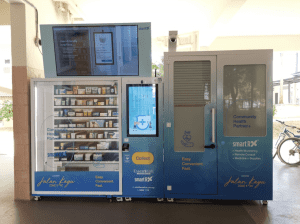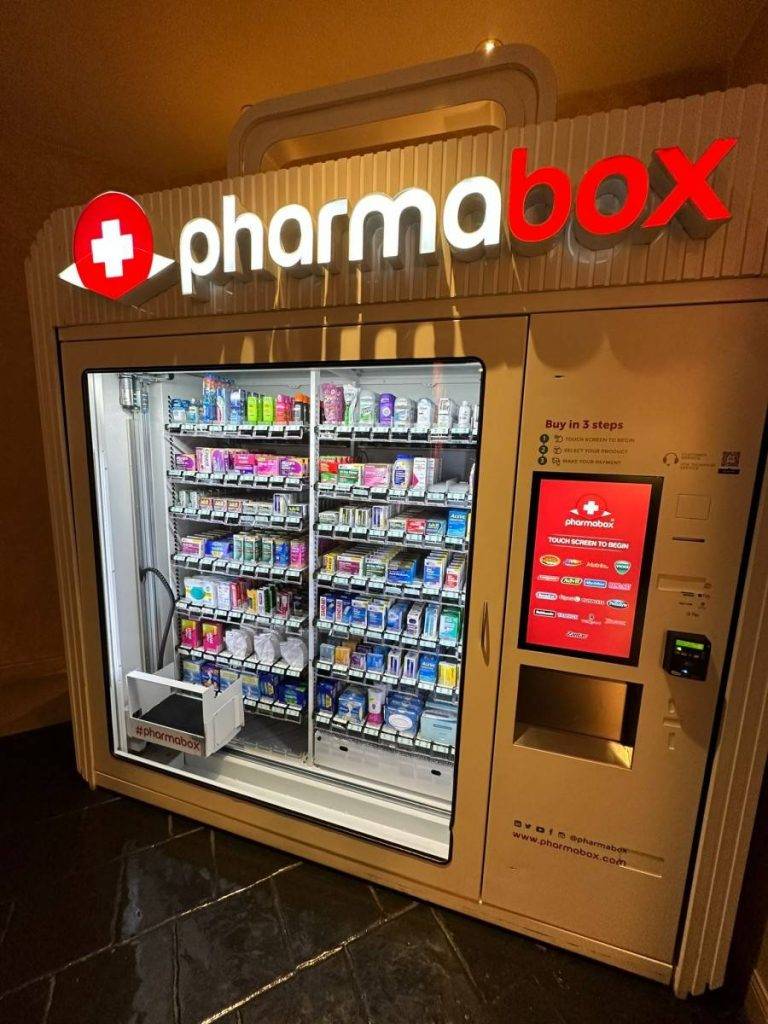Have you ever developed a headache or cold at night but struggled to find medication in your cabinet and all the pharmacies have closed?
Well, here’s your solution! SmartRx and Essentials Pharmacy have jointly deployed community vending machines for over-the-counter (OTC) medication and first aid equipment.

Since being installed in June 2022, the vending machine has served residents in the area 24/7, providing more than 70 types of pharmaceutical products for a variety of conditions from cold, headache, and diarrhoea, to nasal decongestants and band-aids for small cuts. To make life even easier, the items are not over-priced, and some are even cheaper than mainstream pharmacies in local shopping centres. If a patient is not certain which items suit them, friendly staff will answer the call on the other side to help with their queries.
So far, it has installed five vending machines across Singapore for different purposes – some for traditional Chinese remedies, some for dental-related products, and some for restricted medications that require a prescription. The company indicated that by the end of 2023, it plans to install 50 more units in locations such as supermarkets, petrol stations and ActiveSG centres.
Taking a step back, assuming I’m generally healthy without chronic health issues, what are the medications or pharmaceutical products I need to prepare at home, just in case? Medical Channel Asia recommends the following to always keep them handy:
- Pain relievers: Paracetamol or ibuprofen can help alleviate headaches, and muscle aches, and reduce fever.
- Antihistamines: Useful for relieving allergy symptoms such as sneezing, itching, and runny nose. Examples include loratadine or diphenhydramine. They can be either nasal sprays or oral tablets.
- Cough and cold medicines: A cough suppressant like dextromethorphan and a decongestant like pseudoephedrine can help manage common cold symptoms. However, in some jurisdictions, they may require a prescription.
- Laxatives or anti-diarrheal medications: Having options like psyllium husk for constipation or loperamide for diarrhoea can help with bowel symptoms and maintain a healthy appetite.
- Antacids: These can provide relief from heartburn or indigestion caused by excess stomach acid. Examples include calcium carbonate or ranitidine.
- Oral rehydration solution: Useful for replenishing electrolytes and fluids in cases of dehydration caused by illnesses like diarrhoea or vomiting. They can be also used during intense exercise to replenish the loss of electrolytes from sweat.
- Antiseptics: Hydrogen peroxide or rubbing alcohol can be used to clean minor cuts and wounds. Be careful that they especially need to be carefully stored in a cool dry place without direct sunlight. Otherwise, the active substance evaporates and you end up with an expensive bottle of water.
- Bandages and adhesive dressings: Assorted adhesive bandages and sterile dressings can help protect wounds from infection.
- Thermometer: A digital thermometer is essential for monitoring body temperature accurately.
- Topical antibiotic ointment: Such as Neosporin or Bacitracin, can help prevent infection in minor cuts, scrapes, or burns. Again, in some jurisdictions, they might require a prescription.
Overall, vending machines can reduce people’s stress during after-hours when they are unwell. And in some instances, might reduce the number of unnecessary trips to hospital emergency departments as well. When preparing and taking those medications, strictly follow the advice in the manuals. Some medications interact in your body when taken together and can bring adverse side effects. Always consult your local doctor or pharmacist if you are unsure. For more information on what medication to prepare and if you’d like more personalized advice, book an appointment with your local doctor now.

